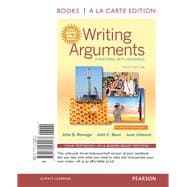NOTE: This edition features the same content as the traditional text in a convenient, three-hole-punched, loose-leaf version. Books a la Carte also offer a great value; this format costs significantly less than a new textbook. Before purchasing, check with your instructor or review your course syllabus to ensure that you select the correct ISBN. Several versions of Pearson's MyLab & Mastering products exist for each title, including customized versions for individual schools, and registrations are not transferable. In addition, you may need a Course ID, provided by your instructor, to register for and use Pearson's MyLab & Mastering products.
For courses in Argument and Research.
This version of Writing Arguments: A Rhetoric with Readings has been updated to reflect the 8th edition of the MLA Handbook (April 2016). The 8th edition introduces sweeping changes to the philosophy and details of MLA works cited entries. Responding to the “increasing mobility of texts,” MLA now encourages writers to focus on the process of crafting the citation, beginning with the same questions for any source. These changes, then, align with current best practices in the teaching of writing which privilege inquiry and critical thinking over rote recall and rule-following.
The most thorough theoretical foundation available
Writing Arguments: A Rhetoric with Readings, 10/e integrates four different approaches to argument: the enthymeme as a logical structure, the classical concepts of logos, pathos, and ethos, the Toulmin system, and stasis theory. Focusing on argument as dialogue in search of solutions instead of a pro-con debate with winners and losers, it is consistently praised for teaching the critical-thinking skills needed for writing arguments. Major assignment chapters each focus on one or two classical stases (e.g. definition, resemblance, causal, evaluation, and policy). Each concept is immediately reinforced with discussion prompts, and each chapter ends with multiple comprehensive writing assignments. This comprehensive version contains a superlative thematic anthology of arguments on contemporary topics and some classics for balance.
Also available in a Brief version with rhetoric only (0133910695) and a Concise version (013396986X) which is a redaction of the Brief edition.
You can also purchase a loose-leaf print reference to complement Revel Writing Arguments: A Rhetoric with Readings . This is optional.








